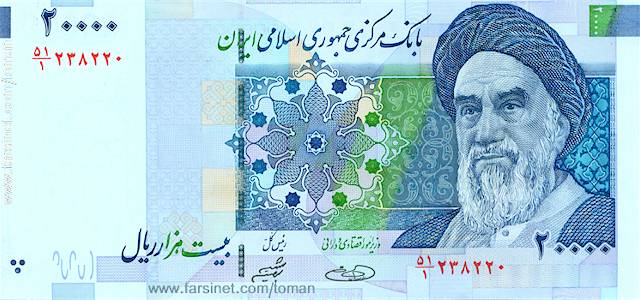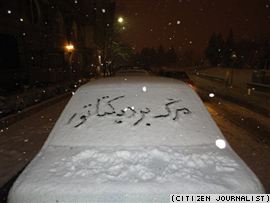The Latest from Iran (20 January): Running on Empty?
 2135 GMT: Economy Watch. Ayande News, blaming subsidy cuts on fuel, says car sales have fallen by 50% with the market in imported cars almost dormant.
2135 GMT: Economy Watch. Ayande News, blaming subsidy cuts on fuel, says car sales have fallen by 50% with the market in imported cars almost dormant.
Khabar Online, linked to Ali Larijani, continues to push the Government on economic claims. The latest case is a challenge to the claim of 1st Vice President Mohammad Reza Rahimi that 1.5 million new jobs have been created: Khabar says only 600,000 of these were new jobs and 900,000 replaced other positions.
2115 GMT: Running on Empty? Back to where we started this morning. MP Ali Motahari, pressing his argument that the Government is not only unwilling but unable to provide the funds for expansion of the Tehran Metro, claims that Minister of Economy Shamseddin Hosseini has said the Government does not want to implement laws mandating $2 billion in support of the expansion.
Motahari said the Government must at least allocate part of the $2 billion and asserted that he will President Ahmadinejad in the Majlis about the issue.
1720 GMT: A Warning. The head of judiciary, Sadegh Larijani, has condemned lawyers who give interviews to the media: “Unfortunately some lawyers are failing to attend to their main responsibility while they can avoid many tensions by doing so. These lawyers have no regard for the conditions of their licence and harm the Islamic regime with their interviews and actions,” he added; “and we hope this trend will be rectified.”
Larijani apparently made no explicit reference to the defence attorneys who are in prison already for giving interviews.
In another part of the statement, Larijani continued his battle against other branches of Government, saying security and intelligence agencies must not interfere in the responsibilities of the judiciary.
1640 GMT: Picture of Day. "Death to the Dictator" written in the snow....

1635 GMT: Political Prisoner Watch. The European Parliament by a vote of 79-0, has passed a resolution of "support and solidarity with Iran’s human rights defenders who have been prosecuted and/or arrested due to their human rights activities".
The Parliament calls for the immediate release of attorneys Nasrine Sotoudeh, Shiva Nazar Ahari, Mohammad Seifzadeh, Mohammad Oliyafard, Mohammad Ali Dadkhah, Abdolfattah Soltani, and Houtan Kian.
1610 GMT: Subsidy Watch. Back to our opening topic of the day....
Farnaz Fassihi, writing for The Wall Street Journal, offers an overview of the subsidy cuts that goes beyond superificial reactions and defences. Amongst the points....
Consumption of gasoline and natural gas has fallen, while use of public transport in Tehran is up almost 20%.
The Government stemmed public protest by repeatedly delaying the implementation of the plan, making support payments in advance, restricting the media, and cushioning consumers by threatening penalties against businesses that raised prices to cover increased costs.
Still, the Government has had to pull back even on its limited introduction of the plan. ON Wednesday, the limit on "semi-subsidised" gasoline was raised for cars, trucks, and buses. [Fassihi does not mention earlier concessions on fuel to farmers.]
However, diesel fuels remains 837% more expensive than it was a month ago.
The first electricity bills under the new plan are not sent out until February.
1450 GMT: Green Shoots. A Green Students Committee has been founded at Ashrafi University in Isfahan.
1445 GMT: Karroubi watch. Mehdi Karroubi, meeting the family of detained reformist politician Feizollah Arabsorkhi, has declared that the support of ulema (religious community) for families of political prisoners proves a part of Iran's ruling elite is anti-Islamic.
1440 GMT: The President's Right-Hand Man. Ahmadinejad Chief of Staff Esfandiar Rahim-Mashai may be taking a lot of criticism these days, but he has at least one high-profile fan....
Leading Iranian academic Sadegh Zibakalam praises Rahim-Mashai as modern, youth-oriented, and against violence in Islam. Zibakalam continues that reformists have no chance in the next President elections and Rahim-Mashai is the best choice.
1415 GMT: We'll Let You In, But Only If You Play Nice. Rouhollah Hosseinian, a pro-Ahmadinejad MP, says the condition for the political presence of reformists is that there is no one from the "fitna (sedition) camp".
And Gholam-Reza Mesbahi-Moghaddam, who has been critical of the Government on economic issues, takes a similar line: "Reformists must repent before being accepted again."
1340 GMT: No Footie for Girls. Rah-e-Sabz reports that women have been banned from entering cinemas showing Iran's football matches in the Asian Cup.
1335 GMT: An Energy Enquiry. Deutsche Welle asks a basic question: Why does Iran, with the second-largest natural gas reserves in the world, need to buy natural gas from neighbouring countries?
1315 GMT: Where's Mahmoud? Back from an academic break to catch up with President Ahmadinejad, who is on the second day of his show in Yazd Province in central Iran.
Speaking to managers of provincial agencies, Ahmadinejad's theme was population control: this was an "imperialistic project based on a humanist and pleasure-seeking approach to life".
0830 GMT: Watching the Propaganda. The Twitter account supporting former President Mohammad Khatami brings this to our attention: "[Grand] Ayatollah Makarem Shirazi: Revolution in Tunisia = Islamic Revolution of Iran".
An EA correspondent checks out the story and clarifies it, from this article in IRNA: "Not exactly Tunisia = Islamic Revolution. Ayatollah Makarem-Shirazi is claiming that [Tunisian President] Ben Ali depended on foreigners."
Which I guess, given the themes of regime propaganda, now means that Ben Ali is now a member of the Green Movement.
0800 GMT: The feel-good message from the Iranian Government and its supporters continues to be that subsidy cuts have proven to be a great success --- even though those cuts, while declared, have yet to be fully implemented in practice, even on gasoline --- and Tehran will move from economic strength to strength.
An unintentially humourous example comes this morning in the English-language Tehran Times, "Iran's Foreign Policy and the Subsidy Reform Plan". In fact, there is not a single piece of information about subsidy reform in the entire article. Instead the piece immediately makes the leap, "Now that the subsidy reform plan has gone into effect, the most important issue facing the country is the fact that certain Western countries are making efforts to hinder Iran’s nuclear activities."
Even without information, the feel-good piece concludes:
The Iranian government is certain it has the nation’s support. Due to the close relationship between the people and the government, the people easily accept the government’s decisions in economic matters.
So, Iranian citizens are hopeful that their cooperation with the government will help it improve the national economy, weather the crisis in the area of foreign policy, and achieve its goals.
Here we will stick just with the daily drip of news about the economy. For example, we learn that morning that the Minister of Economy Shamseddin Husseini has allegedly told MP Ali Motahari, a prominent critic of the Government, that financial reserves are "empty" and there is no additional cash for the expansion of the Tehran Metro.
The President and the Parliament have been in a protracted dispute over the Metro, with Ahmadinejad's office refusing to accept the Majlis' allocation of $2 billion to the project.

 Thursday, January 20, 2011 at 8:05
Thursday, January 20, 2011 at 8:05
Reader Comments